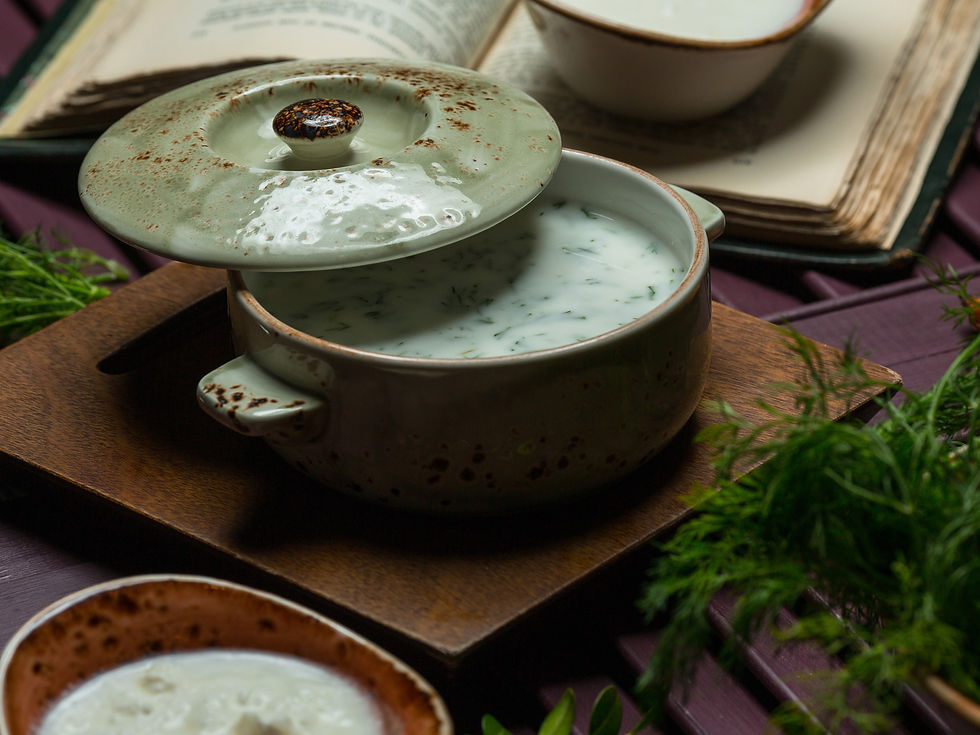Chamomile’s Calming Effect on the Digestive Tract
- Kellen Day
- Jun 17
- 3 min read
Updated: Jun 22

Herbal remedy seekers know that nature often holds the key to gentle digestive relief. Chamomile, long revered for its soothing properties, offers more than just relaxation before bedtime—it exerts a measurable calming effect on the digestive tract. In this post, we’ll explore the gut science behind this daisy‑like herb, practical ways to incorporate chamomile into daily rituals, and how it can complement a targeted soup cleansing routine.
The Calming Effect of Chamomile
Chamomile (Matricaria chamomilla) owes much of its digestive support to bioactive compounds like apigenin and quercetin. These flavonoids have been shown to reduce inflammation in the GI tract by downregulating pro-inflammatory pathways . Inflammation can exacerbate conditions from indigestion to IBS, so chamomile’s ability to soothe irritated mucosa is central to its calming effect.
Gut‑Science Behind Chamomile
Antispasmodic Action: Chamomile relaxes smooth muscle in the intestines, easing spasms that cause cramping and discomfort .
Anti-Inflammatory Properties: By inhibiting cyclooxygenase and lipoxygenase enzymes, chamomile reduces gut inflammation, thereby supporting long-term mucosal health.
Microbiome Balance: Early research suggests chamomile extracts can foster a balanced bacterial environment, which is crucial because a healthy microbiome produces short‑chain fatty acids that nourish colonocytes and fortify the gut barrier.
Together, these mechanisms illustrate why chamomile delivers a holistic calming effect, not simply masking symptoms but addressing the root causes of digestive distress.
Incorporating Chamomile Into Your Routine
Chamomile Tea Infusion: Steep 1 teaspoon of dried chamomile flowers in 8 oz of hot water for 5–10 minutes. Sip slowly after meals to help alleviate postprandial discomfort.
Chamomile‑Enhanced Soup: Stir crushed chamomile petals into a mellow vegetable broth during a soup cleansing day—you’ll gain anti‑inflammatory benefits alongside hydration and nutrients.
Chamomile Tincture: Add 1 mL of chamomile tincture to warm water or tea to concentrate its calming compounds when your gut feels strained.
Aromatic Steam: Inhale chamomile steam over a bowl of hot water for indirect digestive support via the gut‑brain axis, as relaxation itself can improve motility.
Crafting a Chamomile Soup for Digestive Ease
Gentle Base: Use a clear broth—vegetable or bone—to avoid excess acidity.
Aromatic Sauté: Gently heat 1 teaspoon of olive oil with ½ teaspoon of minced garlic and ½ teaspoon of ground chamomile flowers.
Vegetable Blend: Add diced zucchini and carrot; cook until tender.
Chamomile Steep: Remove from heat, stir in 1 teaspoon of chamomile petals, cover, and let steep for 5 minutes.
Finish & Serve: Blend lightly for texture, season with sea salt and a pinch of fresh parsley. This bowl delivers a layered, calming effect—both physically and mentally.
When Chamomile Is Right for You
Chamomile’s safety profile is excellent for most, but consult your healthcare provider if you:
Are you pregnant or breastfeeding
I have a known allergy to the daisy family.
Are on blood‑thinning medications
Scientific studies continually affirm chamomile’s status as a frontline herbal agent for digestive health. For example, chamomile tea has been shown to balance gut bacteria and reduce mucosal inflammation, a key factor in overall GI wellness.
Enhancing Benefits with Holistic Practices
Maximize chamomile’s calming effect by combining it with:
Mindful Eating: Chew slowly and avoid distractions to support proper LES function.
Hydration: Drink water between meals to aid healing and fiber movement.
Stress Reduction: Incorporate deep‑breathing exercises or gentle yoga to modulate the gut‑brain axis.
By layering these habits with chamomile‑focused soup cleansing days, you create a comprehensive approach that nurtures both the microbiome and mucosal lining.
Chamomile’s enduring legacy as a digestive ally rests on a solid foundation of gut science. Its antispasmodic, anti‑inflammatory, and microbiome‑supporting actions converge to deliver a genuine calming effect—one you can experience through simple teas or blended into nourishing soups. Embrace chamomile today and let its gentle power soothe your digestive journey.










Comments